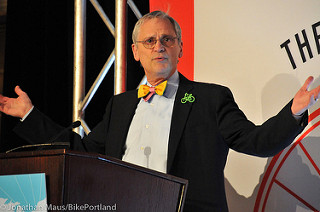Not wanting to be left out of massive bike news in his hometown, U.S. Congressman Earl Blumenauer has just released details on his latest legislative idea: the Bikeshare Transit Act. The legislation is meant to provide stability and “additional flexibility to use federal funds for bikeshare programs.”
Blumenauer wants to make it easier for bike share systems to operate past their initial start-up funding. In Portland’s case, we received a $2 million federal grant for bike share back in 2011. But that money was only enough to start planning. To actually put a system on the ground would take millions more — not to mention an annual operating and maintenance budget of $1.5 to $2 million. With cities under pressure to not spend any local money on bike share, that means they’ve had to hope and pray for big private sponsors. Portland spent years trying to court a suitor before inking their $10 million deal with Nike.
Blumenauer says this uncertainty is due to a lack of a federal funding source. He’s right. When TriMet wants to build a new MAX light rail line they can tap into the New Starts program run by the Federal Transit Administration. There are similar set-aside funding programs for highways, streetcar, aviation, and so on. But for bike share — which is something increasingly being considered a transit system — there’s nothing.
“The Bikeshare Transit Act clarifies that bikeshare projects are eligible for existing federal funding and defines bikeshare in federal transportation law,” said a Blumenauer statement released today. “Giving much-needed certainty to business owners, city and local officials, and commuters alike.”
Here’s more about the legislation from a one-pager released by Blumenauer’s office:
Advertisement
The Bikeshare Act
The Need for Legislation
America is in the middle of a bikeshare revolution: 13 new bikeshare systems launched in 2014 and 11 more launched in 2015, bringing the national total to approximately 80. More than 10 million people rode a bikeshare bicycle last year. Systems are opening in large metropolitan regions like Washington, DC and New York, as well as smaller communities like Dayton and Boise. The increased commercial investment around bikeshare stations and networks drive economic development in these communities.
Some of these existing bikeshare programs received federal monies to get off the ground, but the lack of an established funding source has proved an impediment to other projects across the country. Since the term “bikeshare” is not defined in U.S. code or described by law as a form of transit, bikeshare systems and transportation officials alike now operate in a gray area. Congress needs to act to clarify that bikeshare projects are eligible for federal funding, providing certainty to investors, business-owners, and commuters.
This legislation will eliminate this gray area by defining bikeshare in statute and making bikeshare systems eligible to receive funding to enhance related public transportation service or transit facilities. They will also be listed as an eligible project under the Congestion Mitigation and Air Quality Improvement Program.
Additionally, the Bikeshare Transit Act will allow federal funding to be used for acquiring or replacing bikeshare related equipment and the construction of bikeshare facilities.
The Bikeshare Transit Act will remove significant barriers facing new bikeshare projects as well as those existing bikeshare programs applying for federal funding. This legislation underscores that bikeshare programs drive economic development and are an important part of America’s transportation system.
Blumenauer says he has bipartisan support for the legislation along with endorsements from the American Planning Association, American Public Health Association, The League of American Bicyclists, North American Bikeshare Association, PeopleForBikes, and Transportation for America.
— Jonathan Maus, (503) 706-8804 – jonathan@bikeportland.org



